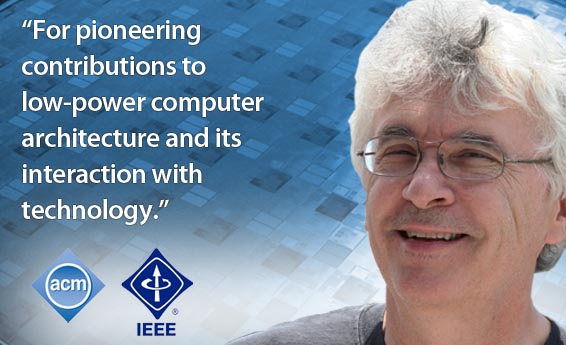Computer architecture innovator Trevor Mudge chosen for top recognition by ACM/IEEE

 Enlarge
Enlarge
Bredt Family Professor of Engineering Trevor Mudge has been chosen to receive the ACM/IEEE Eckert-Mauchly Award, which is widely viewed as the computer architecture community’s most prestigious recognition. Prof. Mudge accepted the award at the 41st International Symposium on Computer Architecture (ISCA), where he gave a keynote address.
Prof. Mudge was selected “for pioneering contributions to low-power computer architecture and its interaction with technology.” He is the third computer architect from the University of Michigan to be singled out for this honor, a testament to the institution’s strength in this area of research. Previous awardees were Yale Patt (now at University of Texas) in 1996 and Edward Davidson in 2000.
Prof. Mudge, who is the Director of the ARM Research Center at Michigan, recognized early that power consumption would become a first-class constraint for computer systems. His inventive approaches have led to new technologies that reduce the energy consumption of microprocessors while maintaining acceptable performance in an era of exponential growth in embedded processors and system-on-chip designs. His contributions have greatly influenced both the research literature and the actual products made possible by his research.
Prof. Mudge’s current research includes investigations into 3D processor architectures, in which a number of processor cores are interconnected on and between a number of layers of silicon, parallel systems that increase the sharing of operations amongst those cores, and near threshold computing (NTC) systems that operate at a low voltage level that is essentially the threshold of error, and which are designed to compensate for inevitable low voltage errors.
According to Prof. Mudge, applications that will benefit from the development of these systems will be “computationally demanding and will often require compact or mobile form factors. Examples include intelligent, real-time search and rescue or reconnaissance systems; new forms of medical devices, such as a low-cost, handheld ultrasound system; processors to power more energy-efficient servers and data centers; and processors for automobiles that will control integrated advanced crash avoidance, navigation, multimedia, and safety systems.”
Prof. Mudge received his PhD in Computer Science from the University of Illinois at Urbana-Champaign in 1977 and joined the faculty at Michigan that year. He is a recipient of the College of Engineering’s Ted Kennedy Family Team Excellence Award and its Research Excellence and Education Excellence Awards. He has held the Bredt Family Chair of Engineering since 2003. He is a Fellow of IEEE.
About the Award
The Eckert-Mauchly Award, co-sponsored by ACM and IEEE Computer Society since 1979, is known as the computer architecture community’s most prestigious award. The award was named for John Presper Eckert and John William Mauchly, who collaborated on the design and construction of the Electronic Numerical Integrator and Computer (ENIAC), the pioneering large-scale electronic computing machine, which was completed in 1947.
Read More


 MENU
MENU